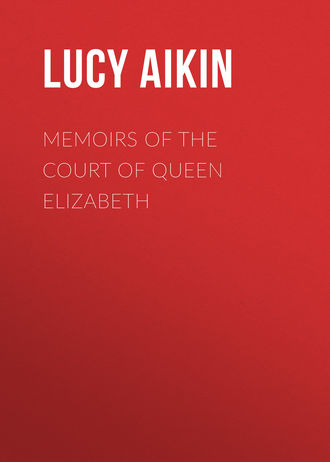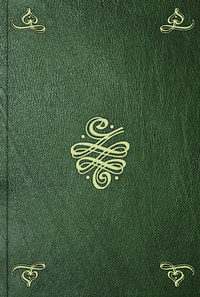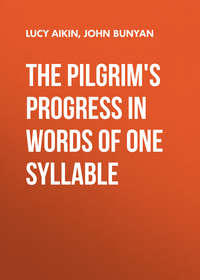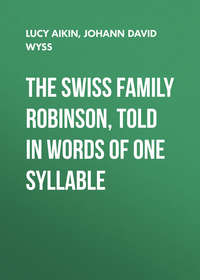 полная версия
полная версияMemoirs of the Court of Queen Elizabeth
The decease of sir Richard Sackville in 1566 called his son, the accomplished poet, to the inheritance of a noble fortune, and opened to him the career of public life. At the time of his father's death he was pursuing his travels through France and Italy, and had been subjected to a short imprisonment in Rome, "which trouble," says his eulogist, "was brought upon him by some who hated him for his love to religion and his duty to his sovereign."
Immediately on his return to his native country the duke of Norfolk, by the queen's command, conferred upon him the honor of knighthood, and on the same day he was advanced by her to the degree of a baron by the style of lord Buckhurst. The new peer immediately shone forth one of the brightest ornaments of the court: but carried away by the ardor of his imagination, he plunged so deeply into the expensive pleasures of the age as seriously to injure his fortune, and in part his credit: timely reflection however, added, it is said, to the counsels of his royal kinswoman, cured him of the foible of profusion, and he lived not only to retrieve, but to augment his patrimony to a vast amount.
Amid the factions of the court, lord Buckhurst, almost alone, preserved a dignified neutrality, resting his claims to consideration and influence not on the arts of intrigue, but on his talents, his merit, his extensive possessions, and his interest in his royal kinswoman. Leicester was jealous of his approach, as of that of every man of honor who affected an independence on his support; but it was not till many years afterwards, and on an occasion in which his own reputation and safety were at stake, that the wily favorite ventured a direct attack upon the credit of lord Buckhurst. At present they preserved towards each other those exteriors of consideration and respect which in the world, and especially at courts, are found so perfectly compatible with fear, hatred, or contempt.
It was about this time, that in one of her majesty's summer progresses an incident occurred which the painter or the poet might seize and embellish.
Passing through Northamptonshire, she stopped to visit her royal castle of Fotheringay, then, or soon after, committed by her to the keeping of sir William Fitzwilliam several times lord-deputy of Ireland. The castle was at this time entire and magnificent, and must have been viewed by Elizabeth with sentiments of family pride. It was erected by her remote progenitor Edmund of Langley, son of king Edward III. and founder of the house of York. By his directions the keep was built in the likeness of a fetter-lock, the well known cognisance of that line, and in the windows the same symbol with its attendant falcon was repeatedly and conspicuously emblazoned. From Edmund of Langley it descended to his son Edward duke of York, slain in the field of Agincourt, and next to the son of his unfortunate brother the decapitated earl of Cambridge; to that Richard who fell at Wakefield in the attempt to assert his title to the crown, which the victorious arms of his son Edward IV. afterwards vindicated to himself and his posterity.
In a collegiate church adjoining were deposited the remains of Edward and Richard dukes of York, and of Cecily wife to the latter, who survived to behold so many bloody deeds of which her children were the perpetrators or the victims. Elizabeth, attended by all the pomp of royalty, proceeded to visit the spot of her ancestors' interment: but what was her indignation and surprise on discovering, that the splendid tombs which had once risen to their memory, had been involved in the same destruction with the college itself, of which the rapacious Northumberland had obtained a grant from Edward VI., and that scarcely a stone remained to protect the dust of these descendants and progenitors of kings! She instantly gave orders for the erection of suitable monuments to their honor: but her commands were ill obeyed, and a few miserable plaster figures were all that the illustrious dead obtained at last from her pride or her piety. These monuments however, such as they are, remain to posterity, whilst of the magnificent castle, the only adequate commemoration of the power and greatness of its possessors, one stone is not left upon another:—it was levelled with the ground by order of James I., that not a vestige might remain of the last prison of his unhappy mother, the fatal scene of her trial, condemnation, and ignominious death.
The close of the year 1567 had left the queen of Scots a prisoner in Lochleven-castle, her infant son declared king, and the regent Murray,—a man of vigor, prudence, and in the main of virtue,—holding the reins with a firm hand. For the peace and welfare of Scotland, for the security of reformed religion, and for the ends of that moral retribution from which the crimes and vices of the rulers of mankind ought least of all to be exempt, nothing could be more desirable than that such a state of things should become permanent, by the acquiescence of the potentates of Europe, and of that powerful aristocracy which in Scotland was unhappily superior to the whole force of the laws and the constitution. But for its destruction many interests, many passions and prejudices conspired. It was rather against Bothwell than against the queen that many of the nobles had taken arms; and more favorable terms would at first have been granted her, could she have been brought to consent as a preliminary to divorce and banish him for ever from her presence. The flight of Bothwell and the prolongation of her own captivity had subdued her obstinacy on this point: it was understood that she was now willing that her marriage should be dissolved, and this concession alone sufficed to bring her many partisans. Sentiments of pity began to arise in favor of an unfortunate queen and beauty, and to cause her crimes to be extenuated or forgotten. All the catholics in Scotland were her earnest friends, and the foreign princes of the same persuasion were unceasingly stimulating them to act openly in her behalf. With these Elizabeth, either by her zeal for the common cause of sovereigns, or by some treacherous designs of her own, was brought into most preposterous conjunction, and she had actually proposed to the court of France that they should by joint consent cut off all communication with Scotland till the queen should be reinstated. The haughty and unconciliating temper of Murray had embittered the animosity entertained against him by several nobles of the blood-royal, each of whom regarded himself as the person best entitled to the office of regent; and an insurrection against his authority was already in contemplation, when Mary, having by her promises and blandishments bribed an unthinking youth to effect her liberation, suddenly reappeared in readiness to put herself at the head of such of her countrymen as still owned her allegiance.
Several leading nobles flocked hastily to her standard; a bond was entered into for her defence, and in a few days she saw herself at the head of six thousand men. Elizabeth made her an immediate offer of troops and succour, stipulating however, from a prudent jealousy of the French, that no foreign forces should be admitted into Scotland; and further, that all disputes between Mary and her subjects should be submitted to her arbitration.
Fortunately for Scotland, though disastrously for the future days of Mary and the fame of Elizabeth, this formidable rising in favor of the deposed sovereign was crushed at a single blow. Murray, with inferior forces, marched courageously against the queen, gained a complete and easy victory, and compelled her to a hasty flight.
Accompanied only by a few attendants, the defeated princess reached the English border. What should she do? Behind her was the hostile army, acting in the name of her son to whom she had signed an abdication of the throne, in virtue of which her late attempt to reinstate herself might lawfully be visited with the rigors of perpetual imprisonment, or even with death itself.
Before her lay the dominions of a princess whose titles she had once usurped, and whose government she had never ceased to molest by her intrigues,—of one who had hated her as a competitor in power and in beauty,—as an enemy in religion, and most of all as the heiress of her crown. But this very princess had interfered, generously interfered, to save her life;
she had shown herself touched by her situation; she had offered her, under certain conditions, succours and protection. Perhaps she would no longer remember in the suppliant who embraced her knees, the haughty rival who had laid claim to her crown;—perhaps she would show herself a real friend. The English people too,—could they behold unmoved "a queen, a beauty," hurled from her throne, chased from her country by the rude hands of her rebellious subjects, and driven to implore their aid? No surely,—ten thousand swords would spring from their scabbards to avenge her injuries;—so she hoped, so she reasoned; for merited misfortune had not yet impaired her courage or abated her confidence, nor had the sense of guilt impressed upon her mind one lesson of humility. Her situation, also, admitted of no other alternative than to confide herself to Elizabeth or surrender to Murray,—a step not to be thought of. Time pressed; fear urged; and resolved to throw herself at the feet of her kinswoman, she crossed, never to return, the Rubicon of her destiny. A common fishing-boat, the only vessel that could be procured, landed her on May 16th 1568, with about twenty attendants, at Workington in Cumberland, whence she was conducted with every mark of respect to Carlisle-castle; and from this asylum she instantly addressed to Elizabeth a long letter, relating her fresh reverse of fortune, complaining of the injuries which she had received at the hands of her subjects, and earnestly imploring her favor and protection.
With what feelings this important letter was received it would be deeply interesting to inquire, were there any possibility of arriving at the knowledge of a thing so secret. If indeed the professions of friendship and offers of effectual aid lavished by Elizabeth upon Mary during the period of her captivity, were nothing else than a series of stratagems by which she sought to draw an unwary victim within her toils, and to wreak on her the vengeance of an envious temper and unpitying heart, we might now imagine her exulting in the success of her wiles, and smiling over the atrocious perfidy which she was about to commit. If, on the other hand, we judge these demonstrations to have been at the time sincere, and believe that Elizabeth, though profoundly sensible of Mary's misconduct, was yet anxious to save her from the severe retribution which her exasperated subjects had taken upon them to exact, we must imagine her whole soul agitated at this crisis by a crowd of conflicting thoughts and adverse passions.
In the first moments, sympathy for an unhappy queen, and the intuitive sense of generosity and honor, would urge her to fulfil every promise, to satisfy or surpass every hope which her conduct had excited. But soon the mingled suggestions of female honor, of policy, of caution, uniting with the sentiment of habitual enmity, would arise, first to moderate, then to extinguish, her ardor in the cause of her supplicant. Further reflection, enforced perhaps by the reasonings of her most trusted counsellors, would serve to display in tempting colors the advantages to be taken of the now defenceless condition of a competitor once formidable and always odious; and gradually, but not easily, not without reluctance and shame and secret pangs of compunction, she would suffer the temptation,—one, it must be confessed, of no common force and aided by pleas of public utility not a little plausible,—to become victorious over her first thoughts, her better feelings, her more virtuous resolves. For the honor of human nature, it may be believed that the latter state of feeling must have been that experienced by a princess whose life had been as yet unsullied by any considerable violations of faith, justice, or humanity: but it must not escape remark, that the first steps taken by her in this business were strong, decided in their character, and almost irretrievable.
Lady Scrope, sister of the duke of Norfolk, was indeed sent to attend the illustrious stranger at Carlisle, and lord Scrope warden of the west marches and sir Francis Knolles the vice-chamberlain were soon after dispatched thither with letters for her of kind condolence: but when Mary applied to these persons for permission to visit their queen, they replied, that, until she should have cleared herself of the shocking imputation of her husband's murder, public decorum and her own reputation must preclude a princess so nearly related to the late king of Scots from receiving her into her presence. That it was however with regret that their mistress admitted this delay; and as soon as the queen of Scots should have vindicated herself on this point, they were empowered to promise her a reception suited at once to a sovereign and a kinswoman in distress.
Had not Elizabeth previously committed herself in some degree by interference in behalf of Mary, and by promises to her of support, no one could reasonably have blamed the caution or the coldness of this reply to a request, which, under all the circumstances, might justly be taxed with effrontery. But in the judgement of Mary and her friends, and perhaps even of more impartial judges, the part already taken by Elizabeth had deprived her of the right of recurring to former events as a plea for the exclusion of the queen of Scots from her presence and favor.
Tears of grief and anger burst from the eyes of Mary on this unexpected check, which struck her heart with the most melancholy forebodings; but aware of the necessity of disguising fears which would pass for an evidence of guilt, she hastily replied, that she was willing to submit her whole conduct to the judgement of the queen her sister, and did not doubt of being able to produce such proofs of her innocence as would satisfy her and confound her enemies.
This was enough for Elizabeth: she was now constituted umpire between the queen of Scots and her subjects, and the future fate of both might be said to lie in her hands; in the mean time she had gained a pretext for treating as a culprit the party who had appealed to her tribunal. We learn that lord Scrope and sir Francis Knolles had from the first received secret instructions not only to watch the motions of Mary, but to prevent her departure; her person had also been surrounded with sentinels under the semblance of a guard of honor. But hitherto these measures of precaution had probably remained concealed from their object; they were now gradually replaced by others of a more open and decided character, and it was not much longer permitted to the hapless fugitive to doubt the dismal truth, that she was once more a prisoner.
Alarmed at her situation, and secretly conscious how ill her conduct would stand the test of judicial inquiry, Mary no sooner learned that Elizabeth had actually named commissioners to hear the pleadings on both sides, and written to summon the regent to produce before them whatever he could bring in justification of his conduct towards his sovereign, than she hastened to retract her former unwary concession.
In a letter full of impotent indignation, assumed majesty and real dismay, she now sought to explain away or evade her late appeal. She repeated her demand of admission to the presence of Elizabeth, refused to compromise her royal dignity by submitting to a trial in which her own subjects were to appear as parties against her, and ended by requiring that the queen would either furnish her with that assistance which it behoved her more than any one to grant, or would suffer her to seek the aid of other princes whose delicacy on this head would be less, or their resentment of her wrongs greater. This last proposal might have suggested to Elizabeth the safest, easiest, and most honorable mode of extricating herself from the dilemma in which, by further intermeddling in the concerns of Scotland, she was likely to become involved. Happy would it have been for her credit and her peace of mind, had she suffered her perplexing guest to depart and seek for partisans and avengers elsewhere! But her pride of superiority and love of sway were flattered by the idea of arbitrating in so great a cause; her secret malignity enjoyed the humiliation of her enemy; and her characteristic caution represented to her in formidable colors the danger of restoring to liberty one whom she had already offended beyond forgiveness. She laid Mary's letter before her privy-council; and these confidential advisers, after wisely and uprightly deciding that it would be inconsistent with the honor and safety of the queen and her government to undertake the restoration of the queen of Scots, were induced to add, that it would also be unsafe to permit her departure out of the kingdom, and that the inquiry into her conduct ought to be pursued.
In spite of her remonstrances, Mary was immediately removed to Bolton-castle in Yorkshire, a seat of lord Scrope's; her communications with her own country were cut off; her confinement was rendered more strict; and by secret promises from Elizabeth of finally causing her to be restored to her throne under certain limitations, she was led to renew her consent to the trial of her cause in England, and to engage herself to name commissioners to confer with those of the regent and of Elizabeth at York.
It would be foreign from the purpose of the present work to engage in a regular narrative of the celebrated proceedings begun soon after at the city last mentioned, and ended at Westminster: some remarkable circumstances illustrative of the character of the English princess, or connected with the fate of her principal noble, will however be related hereafter, as well as their final result;—at present other subjects claim attention.
An embassy arrived in London in 1567, from Ivan Basilowitz czar of Muscovy, the second which had been addressed to an English sovereign from that country, plunged as yet in barbarous ignorance, and far from anticipating the day when it should assume a distinguished station in the system of civilized Europe.
It was by a bold and extraordinary enterprise that the barrier of the Frozen Sea had been burst, and a channel of communication opened between this country and Russia by means of which an intercourse highly beneficial to both nations was now begun: the leading circumstances were the following.
During the reign of Henry VII., just after the unparalleled achievement of Columbus had rendered voyages of discovery the ruling passion of Europe, a Venetian pilot, named Cabot, who had resided long in Bristol, obtained from this monarch for himself and his sons a patent for making discoveries and conquests in unknown regions. By this navigator and his son Sebastian, Newfoundland was soon after discovered; and by Sebastian after his father's death a long series of maritime enterprises were subsequently undertaken with various success. For many years he was in the service of Spain; but returning to England at the close of Henry the eighth's reign, he was received with merited favor at court. Young king Edward listened with eagerness to the relations of the aged navigator; and touched by the unquenchable ardor of discovery which still burned in the bosom of this contemporary and rival of Columbus, granted with alacrity his royal license for the fitting out of three ships to explore a north passage to the East Indies. The instructions for this voyage were drawn up in a masterly manner by Cabot himself, and the command of the expedition was given to sir Hugh Willoughby, and under him to Richard Chancellor, a gentleman who had long been attached to the service of the excellent sir Henry Sidney, by whom he was recommended to this appointment in the warmest terms of affection and esteem.
The ships were separated by a tempest off the Norwegian coast; and Willoughby, having encountered much foul weather and judging the season too far advanced to proceed on so hazardous a voyage, laid up his vessel in a bay on the shore of Lapland, with the purpose of awaiting the return of spring. But such was the rigor of the season on this bleak and inhospitable coast, that the admiral and his whole crew were frozen to death in their cabin. Chancellor in the mean time, by dint of superior sailing, was enabled to surmount the perils of the way. He doubled the North Cape, a limit never passed by English keel before, and still proceeding eastward, found entrance into an unknown gulf, which proved to be the White Sea, and dropped anchor at length in the port of Archangel.
The rude natives were surprised and terrified by the appearance of a strange vessel much superior in size to any which they had before beheld; but after a time, venturing on an intercourse with the navigators, they acquainted them, that they were subjects of the czar of Muscovy, and that they had sent to apprize him of so extraordinary an arrival. On the return of the messenger, Chancellor received an invitation to visit the court of Moscow. The czar, barbarian as he was in manners and habits, possessed however strong sense and an inquiring mind; he had formed great projects for the improvement of his empire, and he was immediately and fully aware of the advantages to be derived from a direct communication by sea with a people capable of supplying his country with most of the commodities which it now received from the southern nations of Europe by a tedious and expensive land-carriage. He accordingly welcomed the Englishmen with distinguished honors; returned a favorable answer to the letter from king Edward of which they were the bearers, and expressed his willingness to enter into commercial relations with their country, and to receive an ambassador from their sovereign. Edward did not live to learn the prosperous success of this part of the expedition, but fortunately his successor extended equal encouragement to the enterprise. A Russia company was formed, of which the veteran Sebastian Cabot was made governor, and Chancellor was dispatched on a second voyage, charged with further instructions for the settlement of a commercial treaty. His voyage was again safe and prosperous, and he was accompanied on his return by a Russian ambassador; but off the coast of Scotland the ship was unhappily wrecked, and Chancellor with several other persons was drowned; the ambassador himself reaching the land with much difficulty. The vessel was plundered of her whole cargo by the neighbouring peasantry; but the ambassador and his train were hospitably entertained by the queen-regent of Scotland, and forwarded on their way to London, where their grotesque figures and the barbaric pomp of their dress and equipage astonished the court and city.
The present embassy, which reached its destination without accident, was one of greater importance, and appeared with superior dignity. It conveyed to the queen, besides all verbal assurances of the friendship of the czar, a magnificent present of the richest furs, and other articles of great rarity; and the ambassadors had it in charge to conclude a treaty of amity and commerce, of which the terms proved highly advantageous for England. They were accompanied by an Englishman named Jenkinson, who had been sent out several years before, by the Russia company, to explore the southern and eastern limits of that vast empire, and to endeavour to open an overland trade with Persia. By the assistance of the czar he had succeeded in this object, and was the first Englishman who ever sailed upon the Caspian, or travelled over the wild region which lies beyond. In return for all favors, he had now undertaken on behalf of the czar to propose to his own sovereign certain secret articles in which this prince was more deeply interested than in any commercial matters, and which he deemed it unsafe to commit to the fidelity or discretion of his own ambassadors.
Ivan, partly by a marked preference shown to foreigners, which his own barbarians could not forgive, partly by his many acts of violence and cruelty, had highly incensed his subjects against him. In the preceding year, a violent insurrection had nearly hurled him from the throne; and still apprehensive of some impending disaster, he now proposed to the queen of England a league offensive and defensive, of which he was anxious to make it an article, that she should bind herself by oath to grant a kind and honorable reception in her dominions to himself, his wife and children, should any untoward event compel them to quit their country. But that never-failing caution which, in all the complication and diversity of her connexions with foreign powers, withheld Elizabeth from ever, in a single instance, committing herself beyond the power of retreat, caused her to waive compliance with the extraordinary proposal of Ivan. She entertained his ambassadors however with the utmost cordiality, gratified his wishes in every point where prudence would permit, and finally succeeded, by the adroitness of her management, in securing for her country, without sacrifice or hazard on her own part, every real benefit which an intercourse with such a people and such a sovereign appeared capable of affording. To have come off with advantage in a trial of diplomatic skill with a barbarous czar of Muscovy, was however an exploit of which a civilized politician would be ashamed to boast,—on him no glory could be won,—and we may imagine Elizabeth turning from him with a kind of disdain to an antagonist more worthy of her talents.





